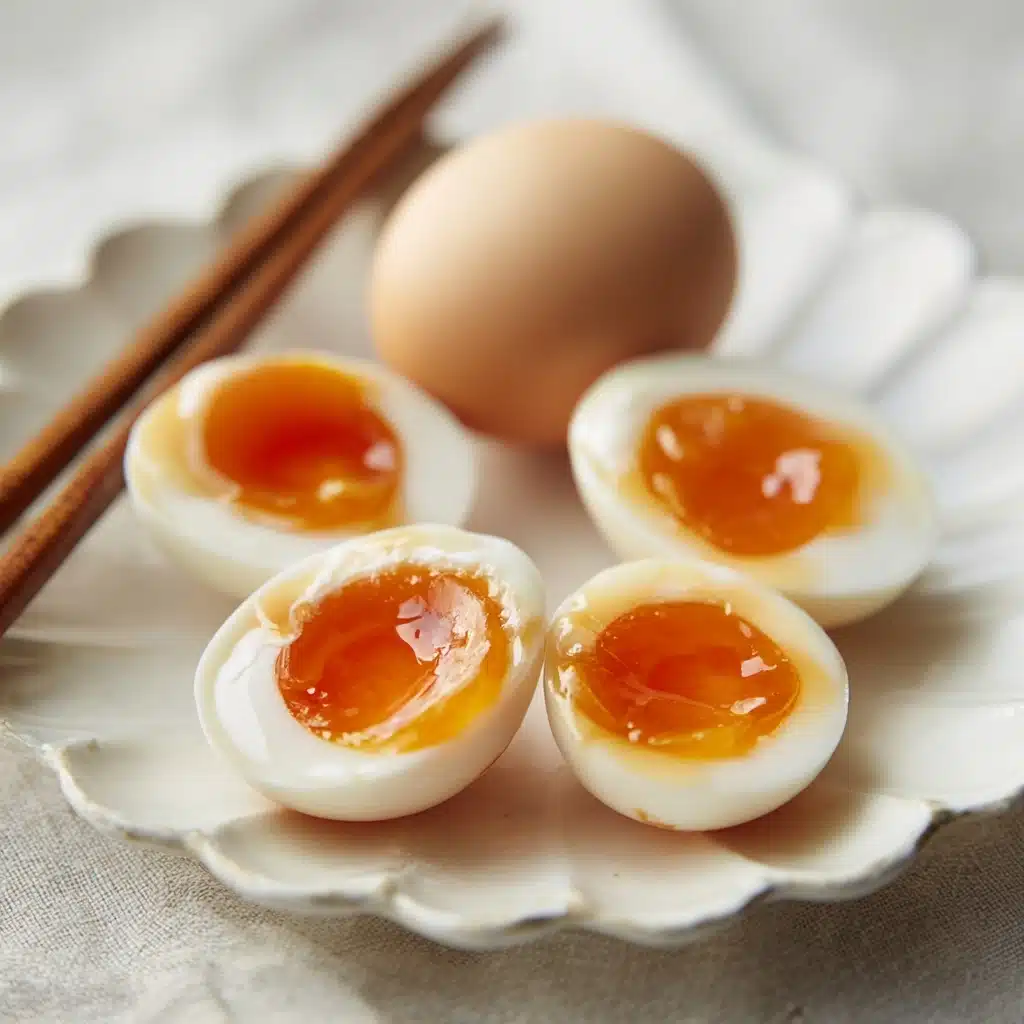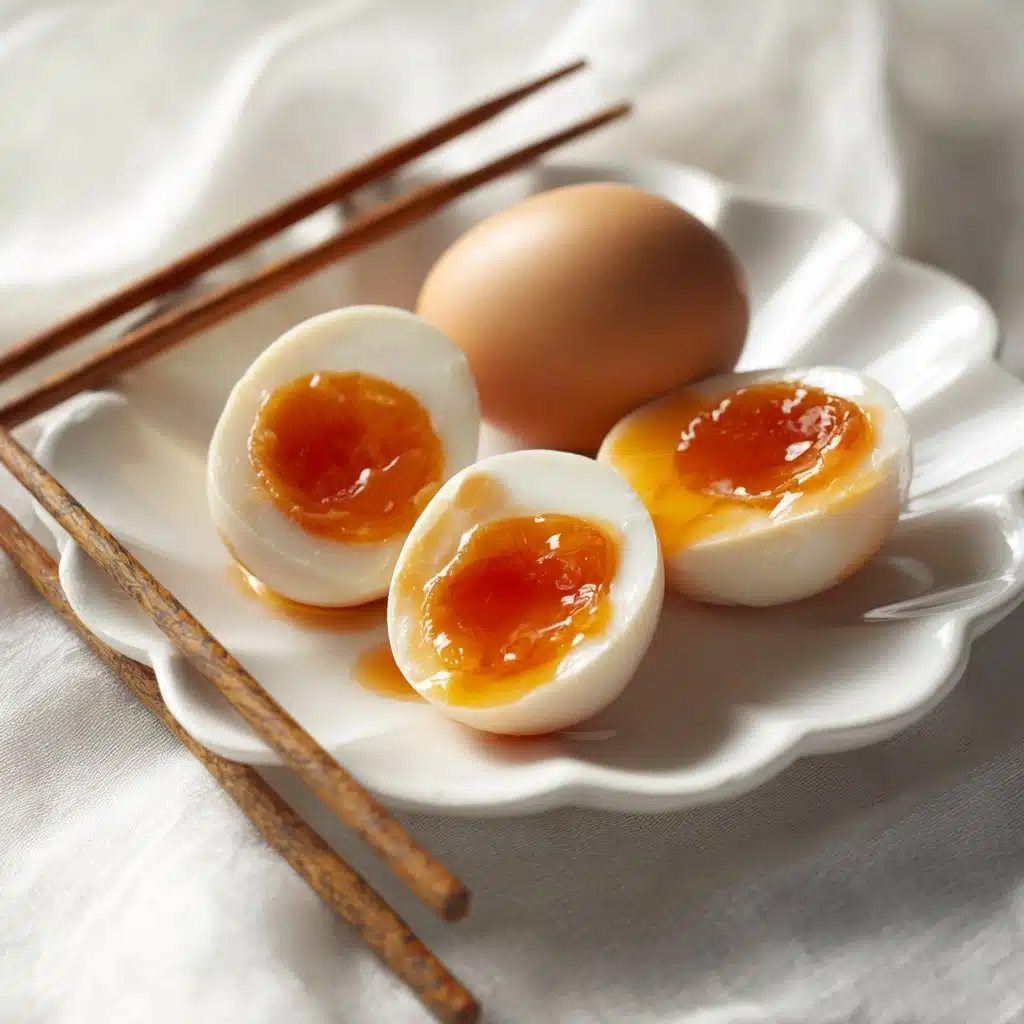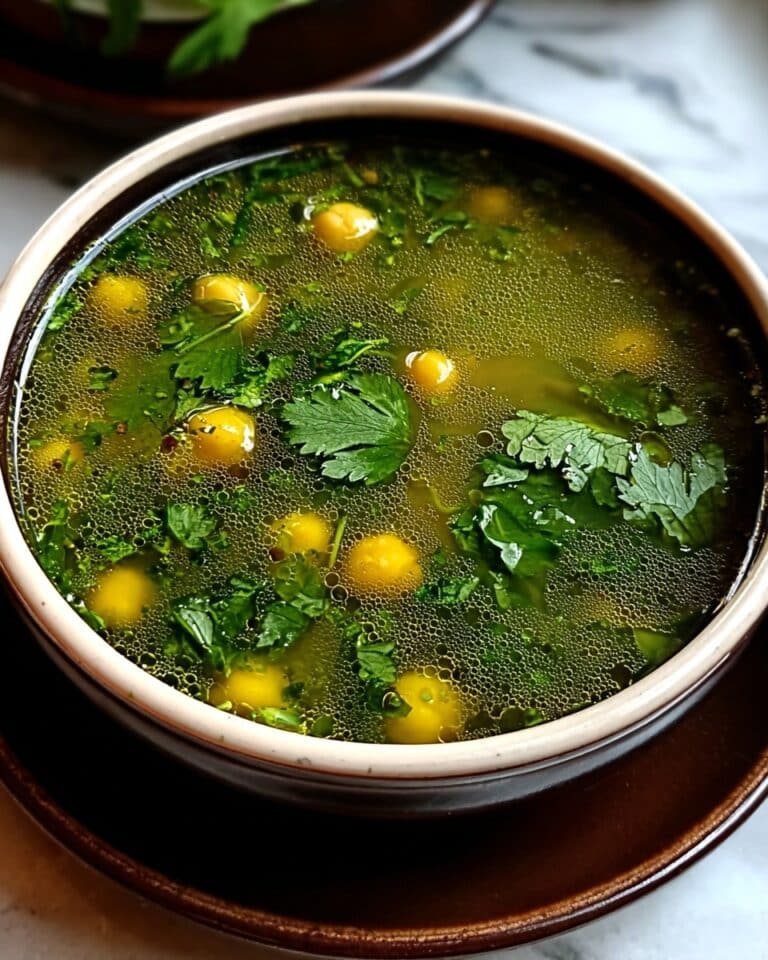Ramen Eggs (Ajitama) Recipe
If you love that rich, savory bite of perfectly soft-boiled eggs soaked in a delicious soy-based marinade, then you are going to fall head over heels for these Ramen Eggs (Ajitama). They bring a delightful balance of sweet, salty, and umami flavors wrapped in a tender, custard-like yolk that transforms any dish into a comforting experience. Whether you’re topping your ramen bowl or enjoying them as a snack, these eggs truly elevate the humble egg into something extraordinary and unforgettable.

Ingredients You’ll Need
Creating the perfect Ramen Eggs (Ajitama) is surprisingly simple, yet every ingredient plays a vital role in delivering the extraordinary flavor and texture of this beloved Japanese treat.
- 6 large eggs: Go for fresh eggs but not too fresh, as slightly older eggs peel easier after boiling.
- Vinegar (optional for boiling): Adding vinegar helps make peeling the eggs a breeze, especially when soft boiling.
- ½ cup light soy sauce: This provides the salty, umami backbone of the marinade without overpowering the egg’s delicate flavor.
- ¼ cup water: Dilutes the soy sauce just enough to balance intensity and let the sweetness shine through.
- ¼ cup mirin: The sweet Japanese rice wine adds a subtle sweetness and glossy finish to the eggs.
- 2 tablespoons granulated sugar: Helps to amplify the sweet-savory harmony and creates a beautiful caramelized tint on the egg whites.
How to Make Ramen Eggs (Ajitama)
Step 1: Boil the Eggs to Perfection
Start by bringing a pot of water to a rolling boil and gently lower your eggs in to avoid cracks. Boil the eggs for exactly 6 minutes to achieve that legendary soft-boiled center with a luscious, jammy yolk. If you want an easier peel, add about 2 tablespoons of vinegar per 5-6 cups of water—this little trick works wonders!
Step 2: Shock and Cool the Eggs
Once your timer dings, immediately transfer the eggs to a large bowl of ice water. This stops the cooking process instantly and helps firm up the whites while keeping the yolks gloriously creamy. Aim to chill them for at least 15 minutes—think of it as the eggs’ time to reset and get ready for their flavorful bath.
Step 3: Prepare the Flavorful Marinade
While your eggs are chilling, whisk together the soy sauce, water, mirin, and sugar in a bowl or marinating container. Stir until all the sugar dissolves completely, creating a beautifully balanced marinade that will soak right into the eggs with perfect harmony.
Step 4: Peel and Marinate
Carefully crack and peel your eggs—this is where patience pays off! Rinse off any stray shell bits if needed. Place the eggs gently into your marinade, making sure they are fully submerged. Pro tip: if some eggs float or parts are exposed, simply turn them around every few hours. Let them soak for at least 8 hours, but overnight is truly best for that deep, irresistible flavor.
Step 5: Ready to Enjoy
After resting in the marinade, your Ramen Eggs (Ajitama) are ready to shine. You can slice them atop a bowl of steaming ramen, enjoy them on their own, or toss them into a variety of dishes that could use a savory boost. Remember, depending on your flavor preference, remove the eggs from marinade between 12 and 36 hours for milder or stronger seasoning.
How to Serve Ramen Eggs (Ajitama)

Garnishes
A sprinkle of toasted sesame seeds or finely sliced green onions adds freshness and textural contrast to Ramen Eggs (Ajitama). For an extra pop of color and flavor, a little drizzle of chili oil or a pinch of shichimi togarashi can take the experience to another level.
Side Dishes
These eggs partner beautifully with a steaming bowl of miso soup, soba noodles, or even a simple rice bowl topped with sautéed veggies. Their rich flavor acts as a perfect counterpoint to the mild, comforting sides you serve alongside.
Creative Ways to Present
Why not use Ramen Eggs (Ajitama) as an intriguing appetizer sliced in half and served with a dab of wasabi mayo? Or, add them to a salad featuring kale, avocado, and sesame dressing for a nutritional powerhouse with bold flavors. The possibilities for pairing and presentation are endless and always delicious.
Make Ahead and Storage
Storing Leftovers
If you have extra Ramen Eggs (Ajitama), keep them stored in their marinade inside an airtight container in the refrigerator. They will stay fresh and flavorful for up to 3 days, making them an excellent make-ahead protein for quick meals.
Freezing
Freezing is not recommended as it can ruin the delicate texture of the soft-boiled yolks. To retain that creamy consistency, enjoy these eggs fresh or refrigerated for best taste and texture.
Reheating
Since these eggs are best enjoyed cold or at room temperature, avoid reheating. If preferred warm, gently bring them to room temperature by resting outside the fridge for about 15 minutes before serving, but never microwave as it changes texture.
FAQs
Can I use hard-boiled eggs instead of soft-boiled?
You can, but traditional Ramen Eggs (Ajitama) are prized for their slightly runny yolks. Hard-boiled eggs won’t have that creamy center but will still absorb the marinade well for a tasty, different experience.
How long can I marinate the eggs?
Ideally, 8 to 12 hours will give you great flavor, but you can go up to 36 hours for a much stronger soy taste. Just be mindful not to go longer than that as the eggs might become too salty or overpowering.
Can I make the marinade ahead of time?
Absolutely! The marinade can be prepared days ahead and kept in the refrigerator. This actually helps the flavors meld, giving you even more depth when you soak your eggs.
What if my eggs crack during boiling?
Gently lowering the eggs into boiling water with a spoon reduces the chance of cracking. Adding a little vinegar can help tighten the whites, but if cracks happen, don’t worry—it just means you’ll have more flavor-soaked egg white.
Can I omit sugar from the marinade?
While you can omit sugar, it’s highly recommended as it balances the saltiness and adds a subtle sweetness. Without it, the eggs may taste overly salty and lack that signature rich glaze.
Final Thoughts
Your kitchen is about to be blessed with one of the simplest yet most flavorful dishes you’ll ever make. These Ramen Eggs (Ajitama) are pure magic in every bite—soft, savory, and perfectly sweetened. Once you try making them at home, you’ll wonder how you ever lived without their golden presence in your meals. So grab those eggs and start marinating your way to eggcellence!
PrintRamen Eggs (Ajitama) Recipe
Ramen Eggs, or Ajitama, are soft-boiled eggs marinated in a savory soy sauce-based mixture. They are perfect as a flavorful topping for ramen or enjoyed as a savory snack. This recipe yields eggs with a creamy, custard-like yolk and a richly seasoned outer layer from the marinade.
- Prep Time: 10 minutes
- Cook Time: 6 minutes
- Total Time: 8 hours 16 minutes
- Yield: 6 ramen eggs 1x
- Category: Appetizer, Snack, Side Dish
- Method: Boiling, Marinating
- Cuisine: Japanese
- Diet: Low Fat
Ingredients
Eggs
- 6 large eggs
- 2 tablespoons vinegar (optional, for boiling)
Marinade
- ½ cup light sodium soy sauce
- ¼ cup water
- ¼ cup mirin
- 2 tablespoons granulated sugar
Instructions
- Boil the eggs: Bring a pot of water to a gentle boil and carefully add the eggs. Boil them for exactly 6 minutes to achieve soft-boiled eggs with slightly runny yolks. Optionally, add 2 tablespoons of vinegar per 5 to 6 cups of water to help make peeling easier.
- Shock the eggs in ice water: Immediately transfer the eggs to a large bowl of ice water to stop the cooking process. Let them cool completely for at least 15 minutes to make peeling easier and preserve a creamy yolk.
- Prepare the marinade: In a bowl or marinating container, combine the soy sauce, water, mirin, and sugar. Stir until the sugar is fully dissolved.
- Marinate the eggs: Gently peel the cooled eggs, rinsing to remove any shell fragments. Place them in the marinade and ensure they are mostly submerged. If not fully covered, rotate the eggs occasionally. Marinate for at least 8 hours, preferably overnight, for full flavor infusion.
- Serve and enjoy: Use the ramen eggs as a delicious topping for noodle soups, as a savory side dish, or as a flavorful snack. Remove any leftover eggs from the marinade after 12 to 36 hours depending on your seasoning preference.
Notes
- Adding vinegar to the boiling water helps make peeling the eggs easier.
- Soaking eggs in ice water for 15 minutes or longer yields better peeling results.
- Marinate eggs for a minimum of 8 hours, but overnight is best for optimal flavor.
- Rotate eggs during marinating if not fully submerged to ensure even seasoning.
- Store leftover marinated eggs in the refrigerator and consume within 3 days.
Nutrition
- Serving Size: 1 egg
- Calories: 70 kcal
- Sugar: 1.5 g
- Sodium: 350 mg
- Fat: 5 g
- Saturated Fat: 1.5 g
- Unsaturated Fat: 2.5 g
- Trans Fat: 0 g
- Carbohydrates: 2 g
- Fiber: 0 g
- Protein: 6 g
- Cholesterol: 185 mg
Keywords: Ramen eggs, Ajitama, soft boiled eggs, Japanese snack, soy marinated eggs








